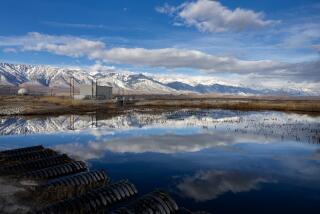Drought May Be Over for California Contractors : Construction: Two Southland firms are the first to benefit from plans by Saudi Arabia and other oil-producing nations to boost capacity.
- Share via
California engineering and construction firms that helped build much of Saudi Arabia’s oil industry have been weathering a dry decade in the desert kingdom and elsewhere, but there are signs that the drought has broken.
Parsons Corp. of Pasadena and Fluor Corp. of Irvine have won multibillion-dollar contracts to build and refurbish oil and gas facilities in Saudi Arabia.
No figures have been released by the companies or by the state-owned Saudi Arabian Oil Co., better known as Saudi Aramco. But analysts estimate that each contract could be worth as much as $4 billion to $6 billion in the next nine years, depending on the eventual scope of the projects.
The contracts are the first oil industry mega-projects to be awarded to U.S. engineering and construction firms since collapsing oil prices ended a construction boom in the early 1980s. But they are not likely to be the last, analysts said.
In fact, the engineering and construction industry is on the verge of a new boom, fueled by growing oil demand and the need to expand oil-production capacity not only in Saudi Arabia, but in many of the 13 members of the Organization of Petroleum Exporting Countries, as well as in non-OPEC nations from Asia to Latin America. Saudi Arabia is OPEC’s largest oil producer and the world’s third largest.
And California firms, which have kept in touch with the Saudis during the lean times, are in a good position to win future projects, analysts said. “It’s a story of patience rewarded,” said Mary Anne Sudol, an energy industry analyst with Fitch Investors Service in New York.
“The scale of the work is much larger than anything (the Saudis) have done in recent years,” said Leonard J. Pieroni, chairman and chief executive of Parsons, a closely held firm. “Certainly this represents some very significant work for us and for others.”
The Parsons and Fluor awards are two of three major projects that the Saudis plan to increase their oil output to anticipate growing world demand in the 1990s. The third is also expected to go to an American firm, analysts said.
By the end of the century, Saudi Arabia plans to boost its production capacity to as much as 10 million to 11 million barrels a day from the current 7 million to 7.5 million. Estimates place the cost of such an expansion from as low as $6 billion to as high as $40 billion, but the most reasonable estimate is about $25 billion.
The wide variation is because of the Saudis’ somewhat open-ended plans. If world oil demand growth does not meet expectations, projects could be scaled back or canceled. In addition, the various project contractors will have some flexibility to decide how to proceed.
Overall, OPEC has estimated that its members will need to spend $60 billion to boost their ability to pump oil to meet world demand in the 1990s. At present, OPEC is producing more than the world market can easily absorb, but economists predict that demand will outstrip OPEC production unless such expansions occur.
In addition to Saudi Arabia, analysts expect major projects to be awarded soon by Kuwait and the United Arab Emirates in the Persian Gulf region, Venezuela in South America and Indonesia in Southeast Asia.
Bechtel Corp. of San Francisco is said to be in the bidding for future contracts as are M. W. Kellogg Co. of Dallas and Foster Wheeler Corp. and Lummus Crest Inc., both of New Jersey.
In Saudi Arabia, Parsons won the contract for projects in Aramco’s southern region; Fluor will handle those in the north. The third contract will cover the central region.
The Parsons and Fluor contracts are structured similarly: five-year initial contracts, with options for as much as four more years of work.
Projects will include taking closed facilities out of mothballs, expanding existing ones and building new plants.
The projects include everything from gas-oil separation factories to pipelines, to offshore platforms and all related infrastructure. The companies will provide program management, engineering and other services; other work is expected to be subcontracted out to a host of other vendors.
Industry analysts don’t foresee the type of gold-rush mentality that characterized Saudi construction projects of the late 1970s, which included Parsons’ creation--from the sand up--of an entire industrial city of 100,000 people in what was once the tiny village of Yanbu on the Red Sea.
The current projects are “an expansion program of a pretty significant magnitude but are being approached in a thoughtful and intelligent manner by the Saudis over the next five to nine years,” said Deborah Land, a spokeswoman for Fluor. “It will probably be a more measured approach than we’ve seen in the past.”
As a sign of the more deliberate approach, neither Fluor nor Parsons would discuss plans to hire additional personnel. Both said the specifics of the projects, including starting times, still had to be worked out.
The caution is in keeping with an industry that has sought to scale back its reliance on huge petrochemical projects in the wake of the first boom’s collapse.
Pieroni guessed that hydrocarbon projects account for only a third of Parsons’ revenue now, compared to about two-thirds in the late 1970s. Fluor also has diversified into other areas.
But both companies have kept a hand in Saudi Arabia during the slow period. Parsons continues work on Yanbu, which was started more than a decade ago. Previously, the company worked on the airport at Jiddah, a natural gas plant in the south and a petrochemical refining complex in Al Jubayl.
Fluor was the managing contractor on the Al Jubayl refinery and did work on a natural gas conservation project in eastern Saudi Arabia as well as other projects.
More to Read
Inside the business of entertainment
The Wide Shot brings you news, analysis and insights on everything from streaming wars to production — and what it all means for the future.
You may occasionally receive promotional content from the Los Angeles Times.










